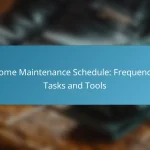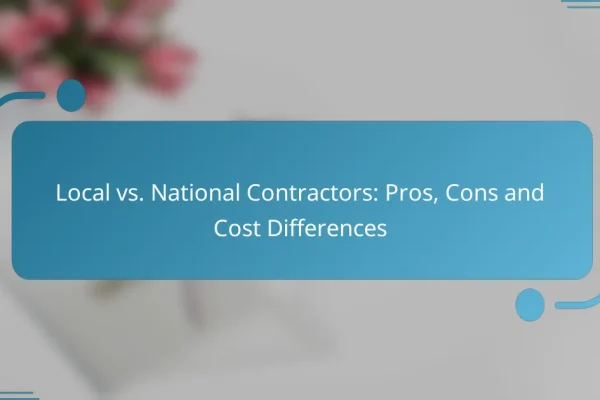How to choose the best renovation contractors in Los Angeles?
To choose the best renovation contractors in Los Angeles, focus on their experience, credentials, and customer feedback. A thorough evaluation of these factors will help ensure you select a reliable contractor who meets your renovation needs.
Check contractor credentials
Verify that the contractor holds the necessary licenses and insurance required in California. This may include a general contractor’s license and liability insurance to protect you from potential liabilities during the renovation process.
Additionally, check for any certifications or affiliations with professional organizations, such as the National Association of the Remodeling Industry (NARI). These credentials can indicate a commitment to quality and industry standards.
Read customer reviews
Customer reviews provide valuable insights into a contractor’s reliability and quality of work. Look for reviews on platforms like Yelp, Google, and Angie’s List to gauge overall customer satisfaction.
Pay attention to recurring themes in the feedback, such as communication, timeliness, and craftsmanship. A contractor with consistently positive reviews is more likely to deliver a satisfactory renovation experience.
Compare quotes
Gather quotes from multiple contractors to understand the market rates for your renovation project. Ensure that each quote includes a detailed breakdown of costs, such as materials, labor, and any additional fees.
When comparing quotes, consider not only the total price but also the scope of work included. A lower quote may not always represent the best value if it lacks essential services or quality materials.
What qualifications should renovation contractors have?
Renovation contractors should possess a combination of licensing, insurance, and relevant experience to ensure quality work and compliance with local regulations. These qualifications help protect homeowners and ensure that projects are completed safely and effectively.
Licensing requirements
Licensing requirements for renovation contractors vary by region, but most areas require contractors to hold a valid license that demonstrates their knowledge of building codes and regulations. Homeowners should verify that the contractor is licensed in their state or locality, as this often indicates a level of professionalism and accountability.
To check a contractor’s license, you can visit your local licensing board’s website or contact them directly. It’s advisable to ensure that the license is current and in good standing, as expired licenses can signal potential issues with the contractor’s business practices.
Insurance coverage
Contractors should carry liability insurance and workers’ compensation to protect both themselves and their clients. Liability insurance covers damages that may occur during the renovation, while workers’ compensation provides coverage for any injuries sustained by workers on the job.
When hiring a contractor, request proof of insurance and verify its validity. This step is crucial to avoid potential financial liabilities that could arise from accidents or damages during the renovation process.
Experience in specific renovations
Experience in specific types of renovations is essential for ensuring that the contractor can handle your project effectively. Different renovations, such as kitchen remodels or bathroom upgrades, require specialized skills and knowledge of materials and techniques.
Ask potential contractors about their past projects and request references. A contractor with a strong portfolio in the type of renovation you need is more likely to deliver satisfactory results. Additionally, consider their familiarity with local building codes and regulations related to your specific renovation type.
What are the costs associated with hiring renovation contractors?
The costs of hiring renovation contractors can vary significantly based on several factors, including project scope, location, and contractor experience. Generally, homeowners should expect to budget for both labor and materials, which can add up quickly depending on the complexity of the renovation.
Average hourly rates in California
In California, the average hourly rate for renovation contractors typically ranges from $50 to $150. Rates can fluctuate based on the contractor’s expertise, the region within California, and the specific type of work being performed. For specialized trades, such as electrical or plumbing work, rates may be higher.
Cost breakdown by project type
The cost of renovation projects can vary widely depending on the type of work. For example, a kitchen remodel may cost between $15,000 and $50,000, while a bathroom renovation might range from $10,000 to $25,000. Smaller projects, like painting or flooring, can be more budget-friendly, often falling within the $1,000 to $5,000 range.
Factors affecting renovation costs
<p severally affect renovation costs, including the size of the project, materials chosen, and labor requirements. High-quality materials and finishes can significantly increase the overall budget, while larger spaces will naturally require more time and resources to renovate.
Additionally, the complexity of the design and any necessary permits can impact costs. Homeowners should consider obtaining multiple quotes and discussing their budget upfront to avoid unexpected expenses during the renovation process.
What questions should you ask renovation contractors?
When selecting renovation contractors, it’s crucial to ask targeted questions that reveal their expertise, reliability, and approach to your project. Key inquiries should focus on timelines, payment structures, and warranty policies to ensure you make an informed decision.
Project timeline inquiries
Understanding the project timeline is essential for planning and coordination. Ask contractors how long they expect the renovation to take, including any phases of work. A typical residential renovation might range from a few weeks to several months, depending on the scope.
Inquire about their availability and how they handle potential delays. It’s wise to discuss what factors could impact the timeline, such as weather conditions or supply chain issues, to set realistic expectations.
Payment structure questions
Clarifying the payment structure is vital to avoid misunderstandings later. Ask contractors about their payment schedule, including deposit requirements and milestones for subsequent payments. Many contractors may request a deposit of around 10-30% upfront, with payments tied to project phases.
Additionally, discuss what forms of payment they accept and whether there are any financing options available. Understanding the total cost and any potential extra charges can help you budget effectively.
Warranty and guarantee policies
Inquire about warranty and guarantee policies to protect your investment. Ask contractors what warranties they offer on their workmanship and materials, as these can vary significantly. A reputable contractor may provide warranties ranging from one to ten years.
It’s also important to understand the process for addressing any issues that arise after the project is completed. Ensure that you have clear documentation of the warranty terms and conditions for future reference.
How to evaluate renovation contractor proposals?
Evaluating renovation contractor proposals involves comparing key elements such as cost, timeline, and scope of work. A thorough review can help you identify the best fit for your project while avoiding potential pitfalls.
Key elements to review
Start by examining the overall cost, which should include labor, materials, and any additional fees. Ensure that the proposal breaks down these costs clearly, allowing you to understand where your money is going.
Next, assess the timeline provided in the proposal. A realistic schedule should outline project milestones and completion dates, helping you gauge whether the contractor can meet your expectations.
Finally, review the scope of work in detail. This section should specify the tasks to be completed, materials to be used, and any warranties offered. A comprehensive scope helps prevent misunderstandings later on.
Red flags to watch for
Be cautious of proposals that lack detail or clarity. Vague descriptions of work or costs can indicate a contractor who may not be trustworthy or organized.
Another warning sign is an unusually low bid. If a proposal is significantly cheaper than others, it may suggest that the contractor is cutting corners or may not deliver quality work.
Lastly, watch for contractors who pressure you to make quick decisions. A reputable contractor will give you time to review and consider their proposal without rushing you into a commitment.
What are the benefits of hiring local renovation contractors?
Hiring local renovation contractors offers several advantages, including better communication, quicker response times, and a deeper understanding of local building codes and regulations. These contractors are often more invested in their community, which can lead to higher quality work and customer satisfaction.
Familiarity with local regulations
Local renovation contractors are well-versed in the specific building codes and regulations that apply to your area. This knowledge helps ensure that your project complies with all legal requirements, potentially saving you from costly fines or delays.
For example, certain cities may have unique zoning laws or permit requirements that must be adhered to. A local contractor will know these nuances and can navigate the permitting process efficiently.
Quicker project turnaround
Local contractors typically have a network of suppliers and subcontractors nearby, which can lead to faster procurement of materials and labor. This proximity can significantly reduce delays that often occur when contractors must source materials from distant locations.
Additionally, local contractors can respond more quickly to any issues that arise during the renovation process, minimizing downtime and keeping your project on schedule.
Stronger community ties
Hiring local renovation contractors supports your community and fosters relationships that can benefit future projects. Local contractors often rely on word-of-mouth referrals and community reputation, motivating them to deliver high-quality work.
Moreover, they may have established relationships with local inspectors and suppliers, which can facilitate smoother project execution and better pricing on materials.












